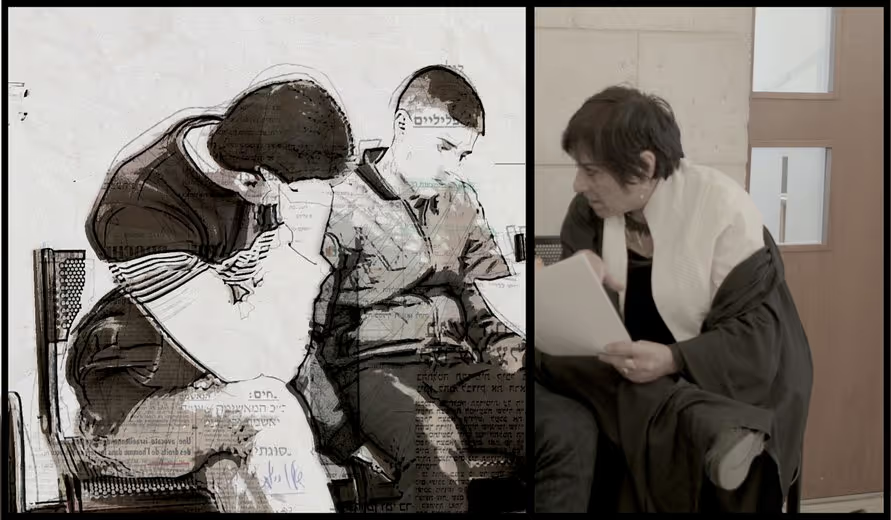Advocate: Delve Deeper Reading List
Adult Nonfiction

A political firebrand in her home country, Israeli defense attorney Lea Tsemel is known by her opponents as "the devil's advocate," for her decades-long defense of Palestinians who have been accused of resisting the occupation.
Allen, Lori. The Rise and Fall of Human Rights: Cynicism and Politics in Occuplied Palestine. Stanford, CA: Stanford University Press, 2013.
The Rise and Fall of Human Rights provides a groundbreaking ethnographic investigation of the Palestinian human rights world—its NGOs, activists, and "victims," as well as their politics, training, and discourse—since 1979. Though human rights activity began as a means of struggle against the Israeli occupation, in failing to end the Israeli occupation, protect basic human rights, or establish an accountable Palestinian government, the human rights industry has become the object of cynicism for many Palestinians. But far from indicating apathy, such cynicism generates a productive critique of domestic politics and Western interventionism. This book illuminates the successes and failures of Palestinians' varied engagements with human rights in their quest for independence.
Chomsky, Noam, and Ilan Pappé, edited by Frank Barat.On Palestine.Chicago: Haymarket, 2015.
Operation Protective Edge, Israel's most recent assault on Gaza, left thousands of Palestinians dead and cleared the way for another Israeli land grab. The need to stand in solidarity with Palestinians has never been greater. Ilan Pappé and Noam Chomsky, two leading voices in the struggle to liberate Palestine, discuss the road ahead for Palestinians and how the international community can pressure Israel to end its human rights abuses against the people of Palestine. On Palestine is the sequel to their acclaimed book Gaza in Crisis.
Erakat, Noura. Justice for Some: Law and the Question of Palestine. Stanford, CA: Standford University Press, 2020.
Justice for Some offers a new approach to understanding the Palestinian struggle for freedom, told through the power and control of international law. Focusing on key junctures―from the Balfour Declaration in 1917 to present-day wars in Gaza―Noura Erakat shows how the strategic deployment of law has shaped current conditions. Over the past century, the law has done more to advance Israel's interests than the Palestinians'. But, Erakat argues, this outcome was never inevitable. Law is politics, and its meaning and application depend on the political intervention of states and people alike. Within the law, change is possible. International law can serve the cause of freedom when it is mobilized in support of a political movement. Presenting the promise and risk of international law, Justice for Some calls for renewed action and attention to the Question of Palestine.
Hannum, Hurst. Rescuing Human Rights: A Radically Moderate Approach. Cambridge: Cambridge University Press, 2019.
This is a multi-disciplinary book with a primary focus on international law and human rights. It analyzes human rights successes and failures, and argues that the role of human rights in foreign affairs continues to be crucial in the twenty-first century.
Khalidi, Rashid.The Iron Cage: The Story of the Palestinian Struggle for Statehood.Boston: Beacon, 2006.
At a time when a lasting peace between the Palestinians and the Israelis seems virtually unattainable, understanding the roots of their conflict is an essential step in restoring hope to the region. In The Iron Cage, Rashid Khalidi, one of the most respected historians and political observers of the Middle East, homes in on Palestinian politics and history. By drawing on a wealth of experience and scholarship, Khalidi provides a lucid context for the realities on the ground today, a context that has been, until now, notably lacking in our discourse.
Pappé, Ilan.The Ethnic Cleansing of Palestine.Oxford: OneWorld, 2006.
Renowned Israeli historian, Ilan Pappé's groundbreaking book revisits the formation of the State of Israel. Between 1947 and 1949, over 400 Palestinian villages were deliberately destroyed, civilians were massacred and around a million men, women, and children were expelled from their homes at gunpoint. Denied for almost six decades, had it happened today it could only have been called "ethnic cleansing". Decisively debunking the myth that the Palestinian population left of their own accord in the course of this war, Ilan Pappé offers impressive archival evidence to demonstrate that, from its very inception, a central plank in Israel's founding ideology was the forcible removal of the indigenous population. Indispensable for anyone interested in the current crisis in the Middle East.
Said, Edward.The Question of Palestine.New York: Vintage, 1979.
This original and deeply provocative book was the first to make Palestine the subject of a serious debate–one that remains as critical as ever. With the rigorous scholarship he brought to his influential Orientalism and an exile’s passion (he is Palestinian by birth), Edward W. Said traces the fatal collision between two peoples in the Middle East and its repercussions in the lives of both the occupier and the occupied–as well as in the conscience of the West. He has updated this landmark work to portray the changed status of Palestine and its people in light of such developments as the Israeli invasion of Lebanon, the intifada, the Gulf War, and the ongoing MIddle East peace initiative. For anyone interested in this region and its future, The Question of Palestine remains the most useful and authoritative account available.
Sfard, Mikharel. The Wall and the Gate: Israel, Palestine and the Legal Battle for Human Rights. New York: Metropolitan Books, 2017.
In The Wall and the Gate, Michael Sfard chronicles this struggle - a story that has never before been fully told - and in the process engages the core principles of human rights legal ethics. Sfard recounts the unfolding of key cases and issues, ranging from confiscation of land, deportations, the creation of settlements, punitive home demolitions, torture, and targeted killings - all actions considered violations of international law. In the process, he lays bare the reality of the occupation and the lives of the people who must contend with that reality.
